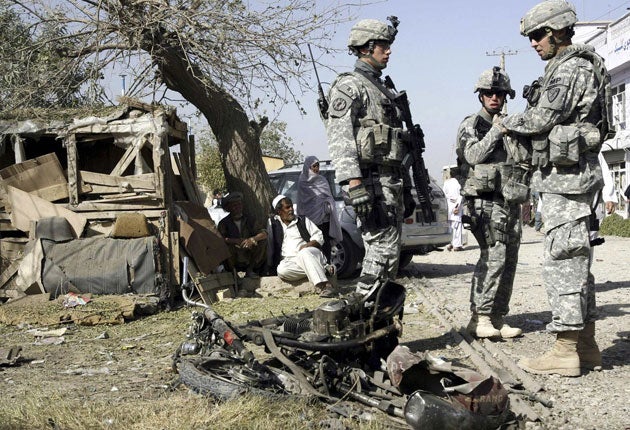Nato launches major offensive to clear Taliban heartland

Your support helps us to tell the story
From reproductive rights to climate change to Big Tech, The Independent is on the ground when the story is developing. Whether it's investigating the financials of Elon Musk's pro-Trump PAC or producing our latest documentary, 'The A Word', which shines a light on the American women fighting for reproductive rights, we know how important it is to parse out the facts from the messaging.
At such a critical moment in US history, we need reporters on the ground. Your donation allows us to keep sending journalists to speak to both sides of the story.
The Independent is trusted by Americans across the entire political spectrum. And unlike many other quality news outlets, we choose not to lock Americans out of our reporting and analysis with paywalls. We believe quality journalism should be available to everyone, paid for by those who can afford it.
Your support makes all the difference.The final and critical phase of the offensive to clear Kandahar, the spiritual home of the Taliban, began yesterday with hundreds of troops carrying out an air assault on the main insurgent base in the region.
The attack on the "Horn of Panjwaii" by American, Afghan and Canadian troops – along with British special forces – is part of a plan to drive militant fighters towards Nato and Afghan forces positioned to intercept them and towards a wide "tank trench" designed to force them away from the orchards and vineyards and on to the main roads.
Retaking the Kandahar hinterland is a key part of the West's exit strategy from the war. General David Petraeus, the US head of Nato troops in Afghanistan, stated that the fierce tempo of military missions – there and in other battlezones in the south and the east – has led to more than 300 Taliban commanders being killed or captured in the past three months.
Major General Nick Carter, the British commander who has been in charge of the Kandahar operation and a previous one to recapture another major Taliban stronghold, Marjah – two of the biggest military missions of the war – emphasised that the operation was key to regional stability. "We have been making steady progress but we are now reaching a very important part of the operation," he said. "Our main aim is to enable freedom of movement for Afghans in areas which used to be under Taliban control and where they used to intimidate the population. Once we have established that, we can begin to see the beginning of governance, of commerce – an Afghan-led process which, hopefully, will bring stability to this region."
Major General Carter is in charge of more than 60,000 Nato troops in southern Afghanistan – the first British officer since the Second World War to command a force that size during a conflict. He cautioned that it may take up to a year for the most violent areas around Kandahar to become stable. He pointed out that Nad-e-Ali in Helmand – held up by Nato and Afghan forces as a place which has relative peace after years of strife – needed that amount of time to make the transition. "It took around 12 months in Nad-e-Ali to get the weight of numbers of Afghan security forces which was needed," he said. "The problem we have here is that so many elders have been killed or driven out. You need leadership at a village level and you need the elders to step up to the plate, this is absolutely vital for the process to go ahead."
Operations such as that in Kandahar are part of a "twin-track" policy designed to drive the insurgents to negotiate with the government of President Hamid Karzai.
The Independent has learned that there are six sets of negotiations, some more viable than others, taking place with the aim of arriving at a cease-fire and paving the way for Western forces to pull out of the conflict.
President Karzai is said to be prepared countenance the return of the Taliban leader Mullah Omar, to Afghanistan, according to senior diplomatic sources. However, the US and UK are unlikely to accept that the leader of the regime which allowed the 9/11 attacks to be organised from his country, and has maintained strong ties with Osama bin Laden, should be given immunity from prosecution.
Although the Afghan President is prepared to deal with the so-called "Quetta Shura", the Taliban's governing council, he is adamant, say diplomatic sources, that the Haqqani network, which has carried out a string of attacks resulting in civilian deaths "cannot be reconciled".
Subscribe to Independent Premium to bookmark this article
Want to bookmark your favourite articles and stories to read or reference later? Start your Independent Premium subscription today.
Join our commenting forum
Join thought-provoking conversations, follow other Independent readers and see their replies
Comments